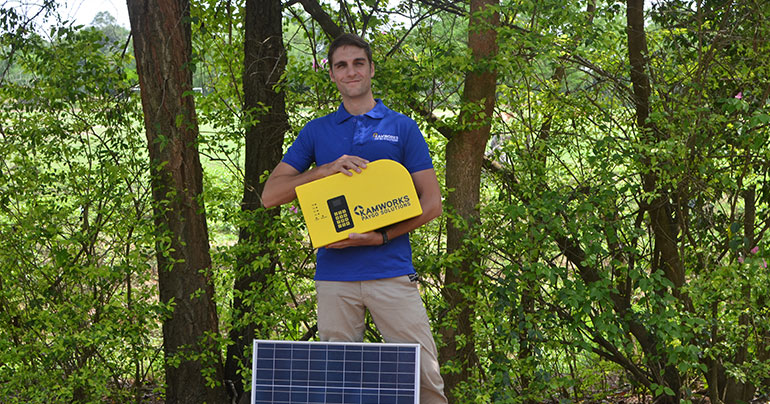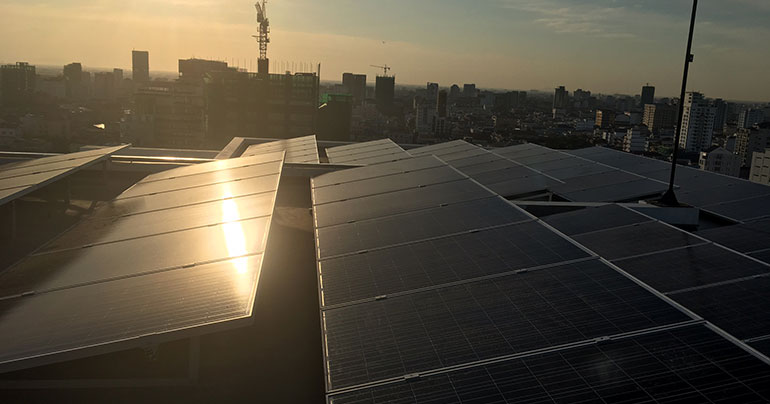As a project manager for Kamworks, one of Cambodia’s leading solar energy companies, Matt Viner is working to develop a solar platform that will provide rural households with affordable, reliable, renewable energy

How have solar energy products changed since Kamworks started in 2006, and why do you think Cambodia’s solar sector continues to struggle to attract investment?
Nowadays, there are more readily available products, often produced in China, and people are beginning to trust and understand the idea of solar energy more and more.
Kamworks is involved in multiple solar projects in Cambodia and abroad, including rooftop solar, solar water pumps, solar street lamps, solar drying – we even have solar systems rigged to help with incubation of chicken eggs. Most recently, we created a pay-as-you-go solar unit to sell to rural households that are not connected to the power grid, ensuring access to dependable electricity.
As of now, there’s not too much investment in solar energy in Cambodia because it’s difficult for investors to predict their returns on investment at this point in time. More than any specific government policy, this uncertainty affects investor confidence.
You’re in charge of developing the pay-as-you-go solar unit for rural households. What gave you the idea for this project, and how does it work?
In terms of productivity, current methods of producing electricity suck. A lot of people use car batteries to power their homes in rural areas, but in about three to six months, car batteries break. If you live in an urban area, you can get electricity by just flipping a switch. But in a rural area, you have to do a lot to get it, and it’s a struggle that’s linked to geography. It’s like getting kicked just because you’re poor. That’s where solar comes in.
[InspireAsean2018]
A pay-as-you-go system functions much like a traditional pay-as-you-go mobile phone in that you buy a top-up and the system produces electricity for your household for a period of time. For our latest system, a solar panel is connected to a unit in the home which provides a display that tells the customer whether or not their battery is charging and how much energy they have remaining.
The pay-as-you-go platform allows solar distributors to finance themselves and provide rural people with consistent access to energy.

In which countries do you see the most potential for this product?
There are a few main factors. First and foremost, it needs to be a sunny country. We work on an average of four to five hours of solar radiance every day, both here in Southeast Asia and in our other target market, sub-Saharan Africa. Sunshine is great. Another strong factor for marketing our PayGo systems is the presence of mobile mining and phone penetration, where people are becoming accustomed to paying for things using their phones. The third factor we look for is a country where a significant number of its people are off grid. Several Southeast Asian countries are solid markets for us.
We believe the future is one where everyone has equitable access to the power grid. We do see the grid expanding in Cambodia, which would make our systems unnecessary here in the long run, which is part of the reason we’ve been looking abroad to markets in several other countries, including Pakistan, Nigeria and Uganda.
What are the pros and cons of using solar energy in Southeast Asia?
I think with any energy source, you have to take into account the environmental costs. Coal is obviously damaging the environment. Personally, I think, too, that even with hydropower we have to be careful. I believe that hydropower can also have huge implications that can be as damaging as coal-powered alternatives. Hydro relies on a strong water source which is subject to change here in the dry season. Then there are questions about the hydrology of the Mekong and the impact on its fisheries – basically, there are a lot of unknown risks and potential downsides to hydro, in comparison to solar and wind technologies.
[manual_related_posts]
I also think solar is so important for a country like Cambodia because this country relies on imported energy, and solar is so easy to harness domestically. [Former American President Barack] Obama has a nice quote about this, basically saying that if a country isn’t in charge of its power, it’s not in charge of its decisions. Cambodia has plenty of sunshine and can take advantage of that.
Solar solution
The company aiming to power up rural Cambodia
As a project manager for Kamworks, one of Cambodia’s leading solar energy companies, Matt Viner is working to develop a solar platform that will provide rural households with affordable, reliable, renewable energy

